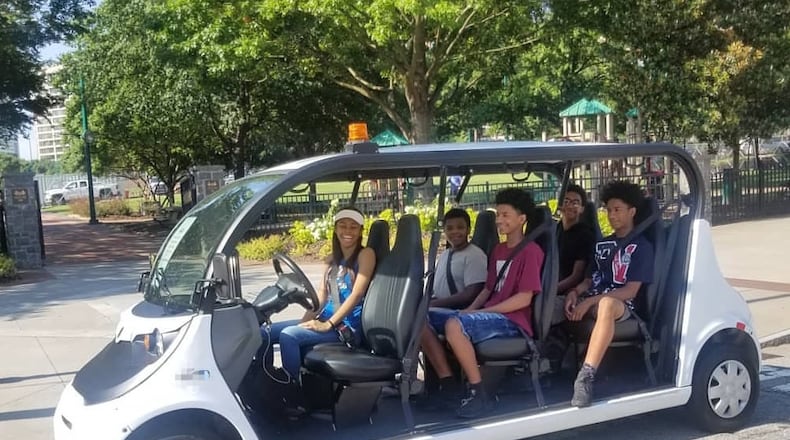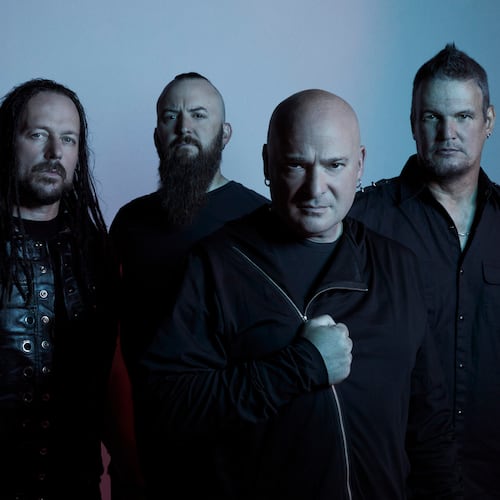When Auna Tyson moved to Atlanta in 2011 to attend college, she found herself without a car. Public transportation didn’t always sync with her schedule so she walked two miles daily from her apartment in Castleberry Hill to the West End MARTA station.
After Tyson graduated with a business degree and an interest in community development, she relied on her own experience to guide her entrepreneurial mindset. Mercedes-Benz Stadium was under development, the community was changing, and Tyson knew that local residents needed better transportation options.
“Everyone can’t afford MARTA every day or Uber or Lyft surge prices,” Tyson said.
Westside neighborhoods are often food deserts leaving residents without access to fresh food. Some residents struggle to find transportation to local programs and resources that offer assistance with food or housing. Tyson also reasoned that as the neighborhood evolved, more residents would want transportation to major events at the new stadium or Georgia World Congress Center.
She founded Strive Transit in 2016 with two electric vehicles, having deemed microtransit a solution that would assist the range of people living in Westside neighborhoods. A pilot program with the city of Atlanta to provide courtesy rides to Westside residents in need of transportation became the biggest component of the company. But in January, Tyson got an opportunity to grow her business in ways that matched her long-term vision.
Tyson is one of eight Westside entrepreneurs to receive inaugural low-cost loans from Westside Future Fund, a nonprofit dedicated to retaining legacy residents and businesses in rapidly changing Westside neighborhoods. The businesses range from a dog spa to a restaurant, all with deep roots in communities on the south and west sides of Atlanta. Tyson said the loan will enable her to purchase more electric vehicles and expand service to other neighborhoods.
“The Program Related Investments (PRI) was founded with the thought in mind that minority and Black entrepreneurs struggle to access capital,” said Cristel Williams, Chief Development Officer of Westside Future Fund (WFF). “With the cost of land, commercial spaces and residential housing increasing rapidly, we have wanted to make sure small businesses on the Westside had access to working capital so they could help drive and benefit from the Westside’s growing prosperity.”
This is, of course, a good thing — entrepreneurs were granted loans up to $70,000 with interest rates of 2% to 3%. But it is unfortunate these businesses even require alternative funding.
The wealth gap is real and as more Atlanta neighborhoods gentrify, the gap only grows larger. A big part of this is history – foundational cracks dating back to the Reconstruction Era that have prevented Black Americans from attaining significant levels of wealth.
During the pandemic, Black-owned businesses were forced to close at more than twice the rate of white businesses. Black-owned businesses received pandemic loans at much lower rates than their white counterparts in part because of racial bias. Researchers in one study from New York University found that Black-owned small businesses were 70% more likely to get PPP loans from online companies which use automated systems because those systems do not have the same racial biases as traditional bankers.
These long-standing disparities mean Black entrepreneurs do not have the buffer of savings or wealth when times get tough.
ZuCot Gallery, the largest Black-owned art gallery in the Southeast, stayed afloat during the pandemic by moving to an appointment-only model for clients, said co-founder, Onaje Henderson. But the owners recognized the need to incorporate technology that would help them to connect with people in and beyond the immediate community. They just didn’t have the capital to do it until they obtained the PRI from Westside Future Fund.
“We are so thankful to WFF for acknowledging and seeing this (need) and helping to fill the void, but it speaks to a larger need we have,” said Henderson. “It is understood that (disparities) are there, but no one is doing anything to correct it.”
Keeping businesses like ZuCot on the Westside is vital. The gallery specializes in original works of living artists in the African Diaspora. They invest significant resources in educating collectors and making sure that African Americans feel welcome in the space.
From hosting field trips for kids and adults in the neighborhood to monthly public forums on collecting, the gallery has always supported the community, Henderson said. And the new attention to the Westside has brought positives and negatives that Black business owners must navigate.
Westside neighborhoods are deep contrasts. In Vine City, for example, a year after the stadium opened, a massive superfund cleanup was initiated after lead was discovered on hundreds of residential properties. To the north in Grove Park, another historically Black and low-income neighborhood, 95% of the homes went under contract when tech giant Microsoft announced its new campus in the area. Homes typically valued in the low $200,000s suddenly jumped by more than 10%.
“If the stadium hadn’t been built on this side of the city, would all of these transitions be happening?” Henderson questioned. “For us, from a business standpoint it is great, but we have to make sure we concentrate on the new community as well as the community that was there before. We can’t stop gentrification, but we can continue to tell our stories.”
The Westside is one of the few neighborhoods in Atlanta where affordable housing still exists, Williams said, which means it is also one of the few neighborhoods where low-income residents can live.
We all want to see the revitalization of neighborhoods that have long been ignored, but that needs to happen in ways that redress past wrongs. Investing in Black businesses that are rooted in the community is a good place to start.
Read more on the Real Life blog (www.ajc.com/opinion/real-life-blog/) and find Nedra on Facebook (www.facebook.com/AJCRealLifeColumn) and Twitter (@nrhoneajc) or email her at nedra.rhone@ajc.com.
About the Author
Keep Reading
The Latest
Featured




